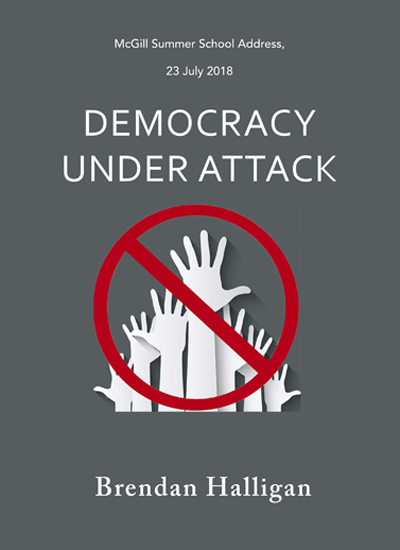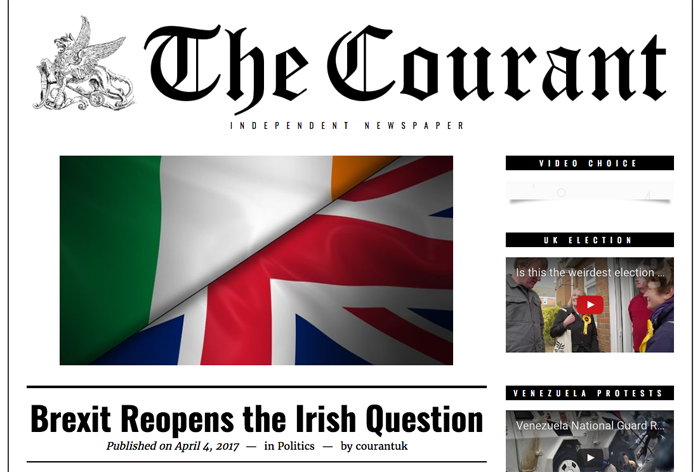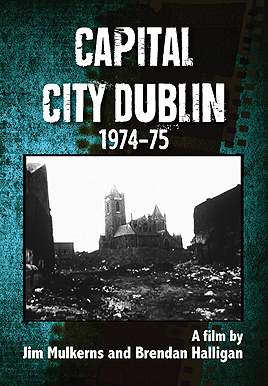WordPress database error: [You have an error in your SQL syntax; check the manual that corresponds to your MySQL server version for the right syntax to use near 'FROM wp_posts
WHERE 1=1 AND ((wp_posts.post_type = 'post' AND (wp_posts.' at line 2]SELECT SQL_CALC_FOUND_ROWS all
FROM wp_posts
WHERE 1=1 AND ((wp_posts.post_type = 'post' AND (wp_posts.post_status = 'publish')))
ORDER BY wp_posts.post_date DESC
LIMIT 0, 10
 The 2018 MacGill Summer School focused on “The Future of Ireland in a New Europe: The challenge Ahead”. As is the practice, the published programme set down the background to the session and said that little was being heard in day to day discourse of the Union’s record on human rights and its defence of freedoms and and this was happening at a time when democracy itself was under attack.The programme went on to say that Europe was threatened within and without by extremist ideologies, aggressive regimes, discrimination and the rejection of democratic values. It consequently argued that the need for a strong Europe had never been greater. This paper opened the session on European values and took as its theme the organisers’ belief that democracy was under attack and clearly in peril.
The 2018 MacGill Summer School focused on “The Future of Ireland in a New Europe: The challenge Ahead”. As is the practice, the published programme set down the background to the session and said that little was being heard in day to day discourse of the Union’s record on human rights and its defence of freedoms and and this was happening at a time when democracy itself was under attack.The programme went on to say that Europe was threatened within and without by extremist ideologies, aggressive regimes, discrimination and the rejection of democratic values. It consequently argued that the need for a strong Europe had never been greater. This paper opened the session on European values and took as its theme the organisers’ belief that democracy was under attack and clearly in peril.
To read the full text, click here or download a PDF here.
In his recent address to the MacGill Summer School, Brendan Halligan looked at Ireland’s current situation in Europe in the light of BREXIT and discusses how, “there is one eminently pragmatic reason to be at the centre, and it’s economic. The disruption from Brexit will be widespread and long lasting and far greater here than in any other EU state.” But remaining at the centre of the EU will not only protect Ireland, but present it with a whole new gamut of possibilities.
To read/download a PDF of this document, click here or scroll down.
A Union without Britain will be a challenge in its own right. Ireland playing a full part at the centre of that Union only magnifies what is already a huge challenge, the biggest since 1939 in the words of Ruairi Quinn.
In considering how we respond, I want to start with what the Union is and what is meant by the centre, in which we‘re being asked to play a full part.
The Union is a Franco/German project. They are building a European home together.
Other countries may join in, but must obey the rules. Joining is voluntary. You don’t have to join. Membership is voluntary too. You don’t have to stay. You can leave if you want to. And if you misbehave, you can be asked to go.
The European Union was famously described as ‘Journey to an Unknown Destination‚‘ by Andrew Shonfield in his Reith Lectures given in 1972. It has a history of progressively enlarging its membership, extending its activities and deepening the interdependence of its members. Progress goes forward in spurts, sometimes at speed. I suspect we are at such a moment. (more…)
Gay Mitchell, former Fine Gael TD and MEP conducts an in-depth interview with Brendan Halligan, Former General Secretary of the Labour Party, MEP and Chairman of the IIEA. This feature is part of an exclusive series of interviews with prominent people in public life presented by Gay Mitchell.
To hear the full interview, click the “play” button at top left below.
This article by Brendan Halligan appeared as analysis number 9
in the “Brexit Insight” series on the IIEA website.

Previous issues of the Brexit Insight have identified the danger of a breakdown in the Brexit negotiations even before the talks begin. Far from disappearing, the danger has been increased by a combination of developments in the EU and separately in the UK. We may be facing into a perfect storm as the following analysis explains.
Things have definitely taken a turn for the worst. The chances of a breakdown in the Brexit talks have increased from 30% to over 50%. And this is before the talks have even begun. They are now expected to start by mid June after the new British government has been put in place. Monday the 19th has been pencilled in.
Three developments have shortened the odds on a breakdown; adoption of the EU negotiating mandate, the publication of the Conservative Party election manifesto and the elaboration of the UK’s negotiating position.
Taking them in turn, the EU negotiating mandate now has the force of law having been adopted by the General Affairs Council on Monday, 22 May. A draft had been in circulation for weeks and had worked its way through the Union’s decision-making process but the key point remains the same: the EU has instructed its negotiator, Michel Barnier, to follow a prescribed agenda in which the UK’s Brexit Bill is to be settled before negotiations can open on the new trade deal with the UK. (more…)
This article was published in the independent publication, The Courant, 4 April 2017

Click here to read the article on The Courant website
It used to be called the Irish Question, and was the biggest issue in British politics. It even caused a mutiny in the British Army and a constitutional crisis in Parliament. Then it disappeared off the radar screen. Suddenly it’s back again – to the dismay of some, the bewilderment of many and the consternation of the few who realise what it entails.
Irish unity is once again a live political issue.
From Dublin it is not hard to divine the root cause of this sudden re-awakening of what seemed a long settled matter. It is Brexit.
Twenty years ago, the British and Irish governments, with the active engagement of the US President and the support of the EU, brokered a peace deal between the Unionist and Nationalist populations in Northern Ireland. Known colloquially as the Good Friday Agreement, it committed the two peoples to permanent power sharing in place of the one-party rule that had proven such a catastrophic failure. A British Irish international treaty, solemnly lodged as such with the United Nations, underwrote the deal and set up an elaborate institutional framework that covered all aspects of the relations between Ireland and Britain, Ireland and Northern Ireland and the two communities in Northern Ireland. This tripartite agreement with inter-locking parts reset the Anglo-Irish Treaty of 1922, which had originally partitioned the island, and it appeared to put the Irish Question to rest for the foreseeable future.
Now it is endangered by Brexit. (more…)
Following the speech by British Prime Minister Teresa May on 17 January, 2017, Brendan Halligan gives an update and analysis as part of the IIEA’s Status Report event the following day.
To hear Brendan’s speech only, click here
To see and listen to the full event (55 mins), click on the IIEA video:
 A new version of Capital City Dublin 1974-75, a film by Brendan Halligan and Jim Mulkerns, was launched last Saturday, 5 November at the Irish Film Institute, and will be screened weekly as part of the Institute’s “Archive at Lunchtime” showings throughout the month of November, 2016.
A new version of Capital City Dublin 1974-75, a film by Brendan Halligan and Jim Mulkerns, was launched last Saturday, 5 November at the Irish Film Institute, and will be screened weekly as part of the Institute’s “Archive at Lunchtime” showings throughout the month of November, 2016.
The previously unreleased short film was made just over forty years ago, when Dublin looked more like a post-war European city in 1946 than a nineteen-seventies European capital. As Secretary of the Irish Labour Party in 1969, Brendan Halligan had originally commissioned independent film maker Jim Mulkerns to film the city as part of footage to be used for party political broadcasts. After filming more material for another party political broadcast in 1973, following which Labour came into power in the National Coalition Government, they worked together to produce a documentary, to show various public authorities with the idea of letting the images speak for themselves and prompt action.
For many years the film existed in silent celluloid only, under the preservation care of the IFI Irish Film Archive. Then, on the film’s fortieth Anniversary, Sunniva O’Flynn and Raelene Casey of the IFI Irish Film Archive facilitated conversion of a digital copy of Capital City Dublin 1974-75 for Scáthán, Halligan’s own publications and media imprint. Design and technical production on a new DVD edition was undertaken by Jim Mulkerns’s daughter Helena, whose company Cyberscribe created the 2016 titles and look.
Next came a new original soundtrack from musician Josh Johnston, who had previously worked with the IFI Irish Film Archive as a live accompanist for screenings of his Grandfather Denis’s film, Guests of the Nation. His score lends a haunting new aspect to the film.
The film with its new score will be screened alongside two other short films by Jim Mulkerns – An tOileánach a d’Fhill (1970) and Ireland Invites You (1966), as part of the Lunchtime Archive Screenings at the IFI throughout the month of November 2016.
The film can be purchased direct from Cyberscribe or at the film shop on the premises of the Irish Film Institute, Temple Bar, Dublin (01-679-5727). To watch the film exclusively on this website, click here.